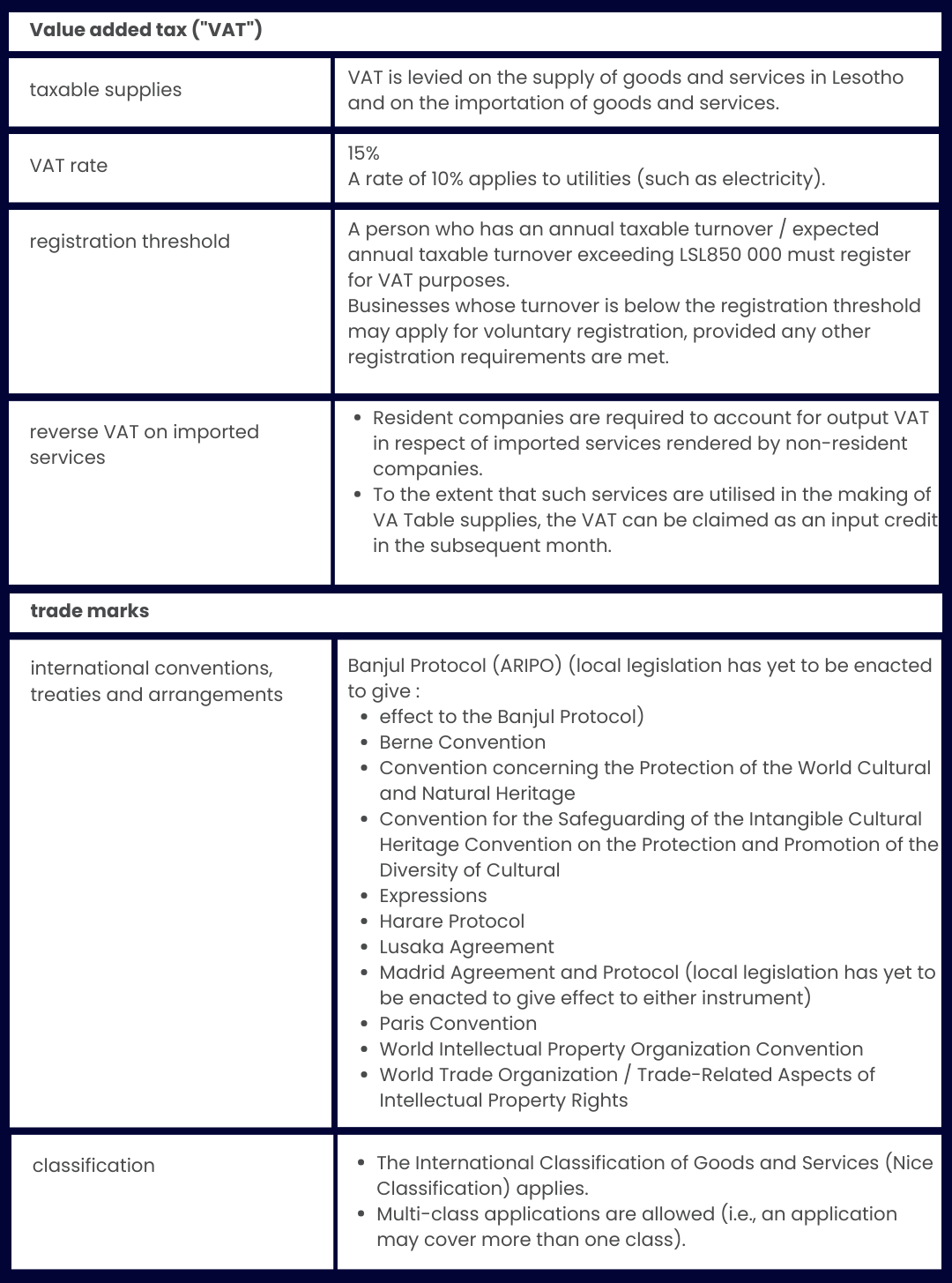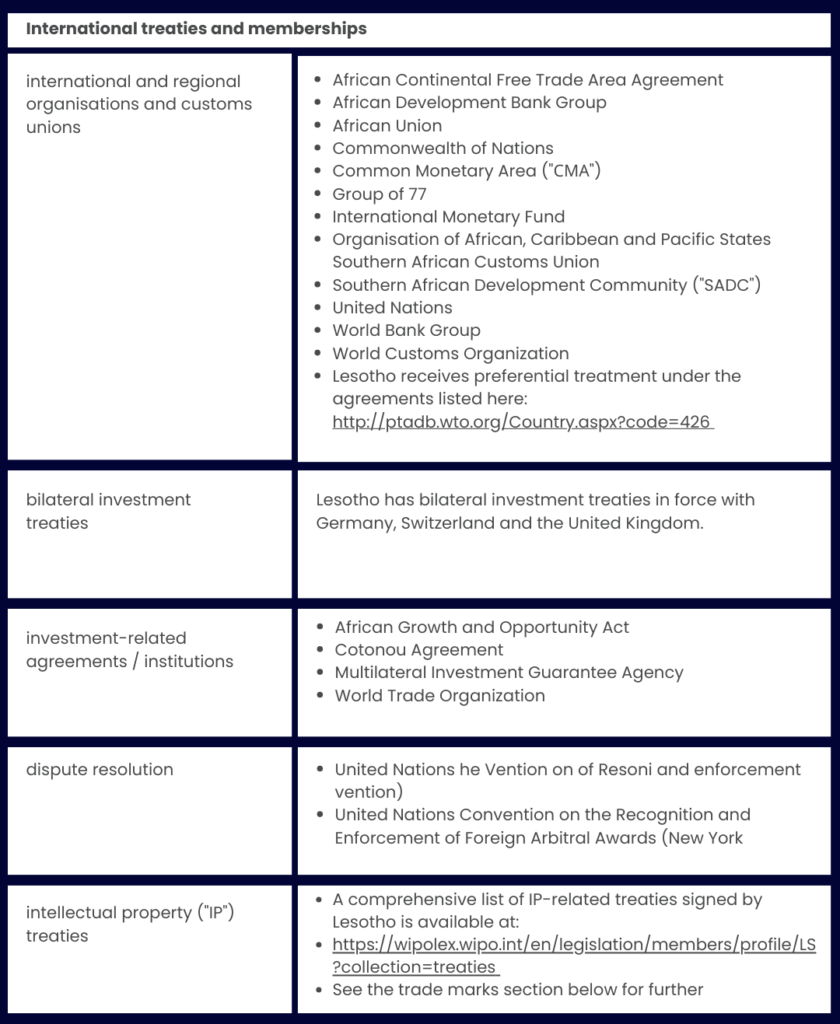Currency
The Loti (plural: Maloti) is the currency of the Kingdom of Lesotho. It is pegged to the South African Rand on a 1:1 basis through the Common Monetary Area and both are accepted as Legal Tender within Lesotho.
The Kingdom of Lesotho, is a landlocked country. It is situated in the Maloti Mountains, and is just over 30 000 square kilometres in size, with a population of approximately two million. It is the only independent state in the world that lies entirely above 1 400 metres in elevation. Its capital and largest city is Maseru.
Lesotho was a British colony and was declared independent from the United Kingdom on 4 October 1966.
It is a sovereign and is a member of the United Nations, the Commonwealth of Nations and the Southern African Development Community.
The Loti (plural: Maloti) is the currency of the Kingdom of Lesotho. It is pegged to the South African Rand on a 1:1 basis through the Common Monetary Area and both are accepted as Legal Tender within Lesotho.
The issue of banking licences is governed by the provisions of the Financial Institutions Act. A minimum paid-up capital of ten million Maloti is required.
The following commercial banks operate in Lesotho:
Lesotho has a parliamentary system and constitutional monarchy. The Prime Minister is head of government and has executive authority. The King largely serves a ceremonial function. The Constitution provides for an independent judicial system and protects civil liberties such as freedom of speech, freedom of association, freedom of the press, freedom of assembly and freedom of religion. Lesotho has a dual legal system consisting of customary and general laws.
In May 2012, after competitive elections, Prime Minister Thomas Thabane formed a coalition government, the first in Lesotho’s history.
Lesotho’s economy is based on the export of diamonds, water sold to South Africa, manufacturing, agriculture, livestock and to some extent the earnings of labourers employed in South Africa. Lesotho also exports wool, mohair, clothing and footwear.
A new Companies Act came into force in May 2012 and introduced major changes to the corporate environment.


The private limited liability company is the most common entity used in practice. There is no longer a minimum share capital for companies.
The Companies Act allows a private limited liability company to be registered with only one shareholder (with a maximum of 50 shareholders). A new set of filing forms have replaced those used under the old Companies Act and a new regulatory filing regimehasbeenintroduced. The CompaniesActalsoprovides for the electronic filing of documents. This process is still in its developmentphase. UndertheCompaniesActdirectorsnow face personal liability for breaches of duties owed to shareholders and shareholders are required to approve any major transaction by special resolution.
At least 51% of the shares in the company must be held by Lesotho citizens if specific trading licences are needed or where it is intended to acquire title to land by lease from the State (under the leasehold land tenure system which applies in Lesotho).
The financial accounts of the company must be audited by an auditor registered to practice in Lesotho although the Income Tax Department accepts without query financial statements from South African external auditors.
It is envisaged that after the final implementation of the Companies Act, the company registration process will take a few days at a cost of approximately 7500 Maloti which includes all fees payable to the Registrar of Companies but does not cover Value Added Tax, licensing and related procedures.
The Registrar is currently embarking on a clean-up exercise that requires all companies registered before May 2012 to re-register to update their records and avoid being struck off the register.
A foreign company may register as an ”external company” in terms of the Companies Act and must do so within 10 days after establishing a place of business in Lesotho. This will require filing (with the Lesotho Registrar of Companies) the foreign company’s statutes of incorporation, the full names and addresses of one or more persons resident in Lesotho who are authorised to accept service of documents in Lesotho as well as the address of the place of business of the external company in Lesotho.
Partnership agreements must be reduced to writing and signed by all the partners before a Notary Public. These agreements may be registered in the Deeds Registry under the Partnerships Proclamation of 1957. A partnership agreement must also be cancelled in writing. Partnerships are restricted to twenty persons. The Proclamation essentially records the common law applicable to partnerships.
This is regulated by the Income Tax Act, together with regulations promulgated under the Act. The rates: residents: the first 48 744 Maloti at 25%. Any excess at 35% non-residents: 25% withholding tax must be deducted at source at the standard rate on dividends, interest, royalties, natural resource payments and charges for a management or administrative service. Withholding tax is levied at 10% of the gross amount of any payment to a non-resident under a Lesotho-source services contract. Capital gains tax applies subject to certain exemptions. Value-added tax is payable on most goods sold and services rendered at the rate of 14%. Basic foodstuffs are zero-rated. The registration threshold is turnover in excess of 500,000 Maloti per year.
Lesotho has signed bilateral treaties relating to double taxation with the United Kingdom, South Africa and Mauritius. It is negotiating tax treaties with Botswana and the Seychelles. The Government has also approved negotiations with Namibia, Swaziland, India, China, United States of America and Australia.
Exchange Controls, Treaties, Bilateral agreements and Membership of International and Regional Organisations Lesotho is part of the Rand Common Monetary Area. Exchange controls apply and are subject to the provisions of the Exchange Control Order and Exchange Control Regulations administered by the Central Bank of Lesotho, which functions in conjunction with the South African Reserve Bank. The commercial banks in Lesotho are appointed as authorised dealers in foreign exchange subject to certain limits. Lesotho is also a member of the Preferential Trade Area (PTA), the Southern African Development Community (SADC), the British Commonwealth, the United Nations (UN) and the Southern African Customs Union (SACU).
Implementation of monetary policy is entrusted to the Central Bank of Lesotho. Price stability is the main goal of monetary policy using indirect policy instruments and a framework for forecasting inflation.
All businesses operating in Lesotho will are required to register with the Ministry of Trade to acquire a Business Licensing Identity Document (ID) and a Business Permit for foreign enterprises.
Certain business activities are reserved for indigenous Basotho and some even require approval from certain governmental sectors.
The legal system of Lesotho is a mixture of common law principles and statutory law. There are also local systems of tribal law and custom in rural districts which govern everyday disputes and property relations but are subordinate to statutory law. The superior courts in Lesotho are the Court of Appeal, the High Court and the Commercial Court.
The road network is estimated at 7 091km with only 1 404km of tarred roads. Several projects are underway to upgrade roads and other infrastructure including water purification plants. The country’s only international airport in Maseru has two asphalt runways and offers a direct link with South Africa’s main airports.
Lesotho is world renowned for its diamonds and the diamonds from some if its mines are of exceptional quality. Mining is also a major contributor of direct foreign investment. The mining sector is regulated by the Mines and Minerals Act, 2005.
Agriculture is undeveloped and consists largely of subsistence crops (mainly maize and wheat). It contributes 7.8% of Lesotho’s GDP. Lesotho is not food self-sufficient and relies on food imports.
The labour force is estimated at 854 600, the majority of which is employed in the agriculture sector. Lesotho has a very high unemployment rate. Labour relations are governed by the Labour Code Order of 1992 and foreign workers require a work permit before taking up employment in Lesotho. There is a statutory minimum wage.
Lesotho has unparalleled natural beauty and the tourism sector offers growth opportunities in setting up accommodation, tour operating and high altitude adventure businesses.
No article or picture may be reproduced\published without the written consent of Mayet & Associates.
© Copyright 2024 Mayet & Associates. All Rights Reserved.
Managed with 🤍 by Cuberoo.